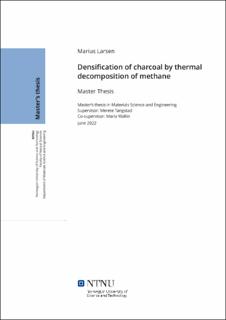| dc.contributor.advisor | Tangstad, Merete | |
| dc.contributor.advisor | Wallin, Maria | |
| dc.contributor.author | Larsen, Marius | |
| dc.date.accessioned | 2022-10-29T17:19:40Z | |
| dc.date.available | 2022-10-29T17:19:40Z | |
| dc.date.issued | 2022 | |
| dc.identifier | no.ntnu:inspera:108217718:37546851 | |
| dc.identifier.uri | https://hdl.handle.net/11250/3028960 | |
| dc.description.abstract | I dette prosjektet ble densifisering av trekull gjennom dekomponering av metan undersøkt. Totalt ble 6 prøvesett analysert, hver med en vekt på ca 350 g. De ulike gradene av densifisering var 10.3 , 11.1 , 24.0 og 29.7 vkt% (vektprosent), i tillegg til ubehandlet trekull og trekull som var blitt oppvarmet med kun argon-gass. Resultatene av densifiserings-eksperimentene viste at mengden densifisering var avhengig av både reaksjons-temperatur og størrelsesfordeling, og resultatene pekte i retning et lineært forhold mellom tid med gasstrømning av metan og mengde deponert karbon, under like temperatur- og størrelsesforhold. Analysen og sammenligningen av andel konvertert metan viste at 5 av 7 eksperiment som hadde reaksjonstemperatur over 1070 grader celsius, hadde en konverteringsandel som var høyere enn 35%. Testing av både kompresjonsstyrke og slipestyrke viste at oppvarmingsprosessen med argon hadde mer effekt på økning av styrke enn selve dekomponeringen av metan. Testing av porøsitet gjennom beregning med absolutt tetthet og tilsynelatende tetthet viste en svak nedgang i porøsitet med stigende grad av dekomonering av karbon, og det viste også at tettheten til det deponerte karbonet var lavere enn tettheten til det ubehandlede trekullet. Testing av porøsitet gjennom SEM og ImageJ viste et stort standardavvik for de ulike gradene av densifisering, men det viste også indikasjoner på en høyere porøsitetsverdi i sentrum av prøven i forhold til på overflaten. Til sist viste energi- og materialbalansen at 1,3 % av materialer går tapt og at det kreves tilførsel av elektrisk energi på 0,52 kwh/ kg karbon innsatt i ovnen når det kjøres forsøk med metan i om lag 3 timer. | |
| dc.description.abstract | In this project, the densification of charcoal through the use of methane decomposition was examined. In total 6 sample sets, each with an weight of about 350 g were analysed. The different degrees of carbon-deposition that was examined was 10.3 , 11.1, 24.0 and 29.7 wt%, in addition to raw charcoal and charcoal heated with only argon-gas. The results of the densification-experiments showed that the amount of densification was depending on both reaction-temperature and distribution of particle-size, and the results also pointed towards a linear relationship between the purging-time of methane and the amount of deposited carbon, under the same temperature and size-conditions. The analysis and comparison of fraction of methane-conversion showed that 5 out of 7 of the experiments done above 1070 degrees Celsius had a conversion-value above 35 %. Testing of both the compression-strength and abrasive strength showed that the heating-process with only argon had a greater effect towards increased strength compared to the methane decomposition-reaction. Porosity-testing with absolute and apparent density showed a small trend towards decreased porosity as the amount of deposited carbon increased, and that the density of the deposited carbon is lower than for the charcoal. The porosity-results done with SEM and ImageJ showed a big standard deviation for the different degrees of densification, but it also showed indications of more porosity in the centre of the samples compared to on the surface. The balance regarding energy and material-flow showed a loss of 1,3% of materials during the densification-process and an electric energy-requirement of 0,52 kwh /kg C input in the furnace when the methane is purging for about 3 hours. | |
| dc.language | eng | |
| dc.publisher | NTNU | |
| dc.title | Densification of charcoal by thermal
decomposition of methane | |
| dc.type | Master thesis | |
